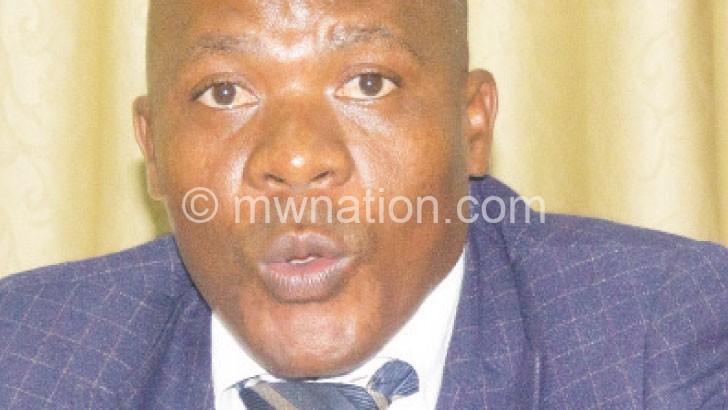Compensate the landless
Centre for Democracy and Economic Development Initiatives (Cdedi) has lately been in the forefront to fight for landless people in Mulanje and Thyolo to reclaim land through demonstrations and calls on various bodies, including Malawi Human Rights Commission (MHRC), to intervene. To their satisfaction, MHRC, the State-funded constitutional body, has found complaints Cdedi filed with it legitimate and is set to probe alleged Malawi Police Service brutality on the people of the two districts and is also engaging Ministry of Lands on the matter. Our staff FRANK NAMANGALE talks to Cdedi executive director SYLVESTER NAMIWA.

What are the major economic and social problems people of Mulanje and Thyolo are facing as regards to land matters?
The tea, macadamia, coffee and tungsten plantations are an outright economic activity, and these attract people from other districts, including others from across the borders. This has led to an increase in population in Thyolo and Mulanje districts, resulting into high population density of 343 persons per square kilometer (km) in Thyolo and 286 persons per square km in Mulanje.
Where there is no land, people live more or less like half human beings. Land is the only natural resource that sustains life. We cannot begin to talk about the right to life and economic activities without talking about land issues.
The shortage of land has lead to overcrowding in classrooms, high stock out of medicines and drugs in public health facilities, high youth and general population migration to the country’s major cities and beyond the borders such as South Africa. The worst scenario has been cases where families literally have no space to construct a dwelling unit, including toilets.
You lodged a complaint with the MHRC, and they said they opted to tackle this matter broadly under the land laws review. Does this address your concerns?
Cdedi has written the MHRC three times: we have written them on issues to do with land laws review; secondly, we have lodged a complaint regarding police brutality following the ugly scenes that happened on November 8 2020 at Khonjeni in Thyolo; and thirdly, we have appealed to the MHRC to call for a public inquiry/hearing on land issues in Malawi.
What the MHRC has opted to tackle has partially answered our concerns, but let me also remind you all Malawians that the land laws were nullified by the landmark nullification of the 1999 Presidential committee on land laws in Malawi, but no further action was taken. This is why we think the MHRC should call for a public hearing so that as a country we should be able to have candid discussions, disclosures, and get honest answers to the hard questions Malawians have as regards the land crisis.
In your complaint to the MHRC, you talk of an arrangement for the locals to have shareholding in the plantations. Is this feasible?
We are demanding that the estates should immediately release all the idle land and make it accessible to the rightful owners. Secondly, we want the locals to benefit in a form of shareholding and finally compensation and public apology from the British government for the vandalism of graves, destruction of crops, injuries and the forced labour, namely Thangata system.
In the petition to President Lazarus Chakwera, you made very serious claims of police brutality on the landless. MHRC has said will probe the issue. Is Cdedi going to cooperate?
The police have never been ashamed to unleash terror on the locals, whose only crime is to raise pertinent questions on the faulty narrative some misguided fellows are trying so hard to sell us by saying that the white settlers bought the land. The people are demanding answers to questions such as; at how much did they buy the land? Under what laws and regulations? Is there proof of payment to support their claims?
We have seen the police mercilessly beating up unarmed people, including women and the elderly. As I am talking to you, Estere Maviyage, aged 63, is admitted to Queen Elizabeth Central Hospital, with a fractured arm; Mr. Chakwana is now bedridden at home; some individuals are serving jail terms for trumped up charges coined to prevent the people from reclaiming what is rightfully theirs.
I would like to challenge you that we have overwhelming evidence to all that we have spoken about. If need be, we will be on the ground helping the investigators with everything they may want to ensure that justice is served.
How can you justify the claim that the British Government must compensate the locals whose land was grabbed from their ancestors by the white settlers?
If you visit any estate in Thyolo or Mulanje at random, chances are that you will find at least a grave yard there. Now, going to the villages close to the estates there are remnants of the people that witnessed the ugly scenes that followed the land grabbing episodes. Very sad and shocking stories are told about how the British used unlicensed guns to assault our ancestors. They slashed crops, destroyed houses, and injured those that resisted the land grab.
We feel the people of Thyolo and Mulanje have wounds that ought to be healed through a public apology, and that the remnants should receive compensation. Our ancestors were dehumanised and Britain should take responsibility for the actions of its citizens, otherwise the wound won’t heal itself.



